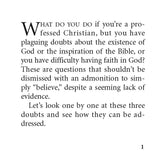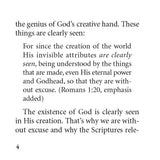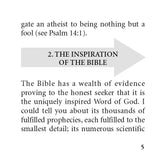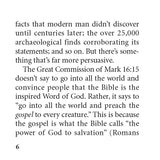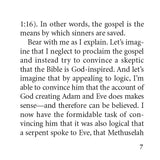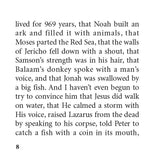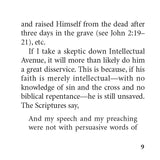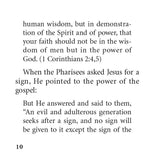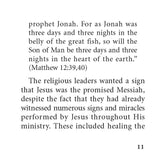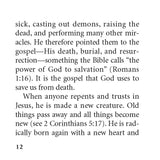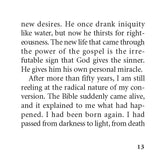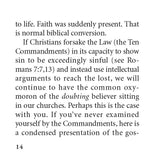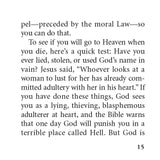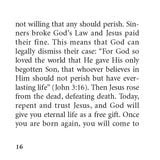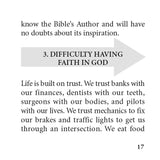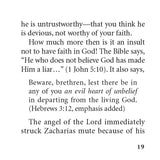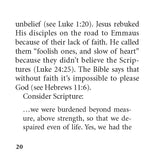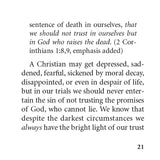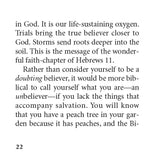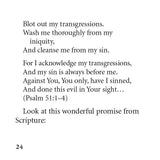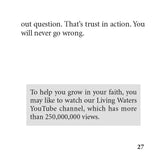Text inside:
WHAT DO YOU DO if you’re a professed Christian, but you have plaguing doubts about the existence of God or the inspiration of the Bible, or you have difficulty having faith in God? These are questions that shouldn’t be dismissed with an admonition to sim- ply “believe,” despite a seeming lack of evidence.
Let’s look one by one at these three doubts and see how they can be addressed.
1. THE EXISTENCE OF GOD
“The existence of God is unprovable. We simply accept it by faith.” That’s a common thought, but it’s not true. It has nothing to do with faith. This is why:
For every house is built by someone, but He who built all things is God. (Hebrews 3:4)
No house ever built itself. Its very existence is evidence of a builder. Even if the builder had died fifty years ago, we know he existed. The building is proof of a builder, without a doubt. No faith is needed. All we need is eyes that can see.
Everything we see—gorgeous flowers, amazing birds, life-giving trees, cute puppies and kittens, delicious fruits, the four seasons, the marvel of the human eye, the miracle of childbirth, male and female in each species, etc.—shows us the genius of God’s creative hand. These things are clearly seen:
For since the creation of the world His invisible attributes are clearly seen, being understood by the things that are made, even His eternal power and Godhead, so that they are with- out excuse. (Romans 1:20, emphasis added)
The existence of God is clearly seen in His creation. That’s why we are with- out excuse and why the Scriptures relegate an atheist to being nothing but a fool (see Psalm 14:1).
2. THE INSPIRATION OF THE BIBLE
The Bible has a wealth of evidence proving to the honest seeker that it is the uniquely inspired Word of God. I could tell you about its thousands of fulfilled prophecies, each fulfilled to the smallest detail; its numerous scientific facts that modern man didn’t discover until centuries later; the over 25,000 archaeological finds corroborating its statements; and so on. But there’s some- thing that’s far more persuasive.
The Great Commission of Mark 16:15 doesn’t say to go into all the world and convince people that the Bible is the inspired Word of God. Rather, it says to “go into all the world and preach the gospel to every creature.” This is because the gospel is what the Bible calls “the power of God to salvation” (Romans 1:16). In other words, the gospel is the means by which sinners are saved.
Bear with me as I explain. Let’s imagine that I neglect to proclaim the gospel and instead try to convince a skeptic that the Bible is God-inspired. And let’s imagine that by appealing to logic, I’m able to convince him that the account of God creating Adam and Eve does makes sense—and therefore can be believed. I now have the formidable task of convincing him that it was also logical that a serpent spoke to Eve, that Methuselah lived for 969 years, that Noah built an ark and filled it with animals, that Moses parted the Red Sea, that the walls of Jericho fell down with a shout, that Samson’s strength was in his hair, that Balaam’s donkey spoke with a man’s voice, and that Jonah was swallowed by a big fish. And I haven’t even begun to try to convince him that Jesus did walk on water, that He calmed a storm with His voice, raised Lazarus from the dead by speaking to his corpse, told Peter to catch a fish with a coin in its mouth, and raised Himself from the dead after three days in the grave (see John 2:19– 21), etc.
If I take a skeptic down Intellectual Avenue, it will more than likely do him a great disservice. This is because, if his faith is merely intellectual—with no knowledge of sin and the cross and no biblical repentance—he is still unsaved. The Scriptures say,
And my speech and my preaching were not with persuasive words of human wisdom, but in demonstration of the Spirit and of power, that your faith should not be in the wisdom of men but in the power of God. (1 Corinthians 2:4,5)
When the Pharisees asked Jesus for a sign, He pointed to the power of the gospel:
But He answered and said to them, “An evil and adulterous generation seeks after a sign, and no sign will be given to it except the sign of the prophet Jonah. For as Jonah was three days and three nights in the belly of the great fish, so will the Son of Man be three days and three nights in the heart of the earth.” (Matthew 12:39,40)
The religious leaders wanted a sign that Jesus was the promised Messiah, despite the fact that they had already witnessed numerous signs and miracles performed by Jesus throughout His ministry. These included healing the sick, casting out demons, raising the dead, and performing many other miracles. He therefore pointed them to the gospel—His death, burial, and resurrection—something the Bible calls “the power of God to salvation” (Romans 1:16). It is the gospel that God uses to save us from death.
When anyone repents and trusts in Jesus, he is made a new creature. Old things pass away and all things become new (see 2 Corinthians 5:17). He is radically born again with a new heart and new desires. He once drank iniquity like water, but now he thirsts for righteousness. The new life that came through the power of the gospel is the irrefutable sign that God gives the sinner. He gives him his own personal miracle. After more than fifty years, I am still reeling at the radical nature of my conversion. The Bible suddenly came alive, and it explained to me what had happened. I had been born again. I had passed from darkness to light, from death to life. Faith was suddenly present. That is normal biblical conversion.
If Christians forsake the Law (the Ten Commandments) in its capacity to show sin to be exceedingly sinful (see Ro- mans 7:7,13) and instead use intellectual arguments to reach the lost, we will continue to have the common oxy- moron of the doubting believer sitting in our churches. Perhaps this is the case with you. If you’ve never examined yourself by the Commandments, here is a condensed presentation of the gospel—preceded by the moral Law—so you can do that.
To see if you will go to Heaven when you die, here’s a quick test: Have you ever lied, stolen, or used God’s name in vain? Jesus said, “Whoever looks at a woman to lust for her has already com- mitted adultery with her in his heart.” If you have done these things, God sees you as a lying, thieving, blasphemous adulterer at heart, and the Bible warns that one day God will punish you in a terrible place called Hell. But God is not willing that any should perish. Sinners broke God’s Law and Jesus paid their fine. This means that God can legally dismiss their case: “For God so loved the world that He gave His only begotten Son, that whoever believes in Him should not perish but have ever- lasting life” (John 3:16). Then Jesus rose from the dead, defeating death. Today, repent and trust Jesus, and God will give you eternal life as a free gift. Once you are born again, you will come to know the Bible’s Author and will have no doubts about its inspiration.
3. DIFFICULTY HAVING FAITH IN GOD
Life is built on trust. We trust banks with our finances, dentists with our teeth, surgeons with our bodies, and pilots with our lives. We trust mechanics to fix our brakes and traffic lights to get us through an intersection. We eat food prepared by unseen hands in restaurants trusting that they are clean, and eat food in cans at home trusting that it’s salmonella free. The alternative to daily exercising trust would be to live in paranoia.
Not to have faith in someone is an insult. Tell your spouse that you don’t trust him or her, and it could ruin your relationship. Tell your boss that you don’t trust him, and it won’t be long until you’re out of a job. To fail to trust someone is to insult him. It’s to say that he is untrustworthy—that you think he is devious, not worthy of your faith.
How much more then is it an insult not to have faith in God! The Bible says, “He who does not believe God has made Him a liar…” (1 John 5:10). It also says,
Beware, brethren, lest there be in any of you an evil heart of unbelief in departing from the living God. (Hebrews 3:12, emphasis added)
The angel of the Lord immediately struck Zacharias mute because of his unbelief (see Luke 1:20). Jesus rebuked His disciples on the road to Emmaus because of their lack of faith. He called them “foolish ones, and slow of heart” because they didn’t believe the Scrip- tures (Luke 24:25). The Bible says that without faith it’s impossible to please God (see Hebrews 11:6).
Consider Scripture:
…we were burdened beyond measure, above strength, so that we despaired even of life. Yes, we had the sentence of death in ourselves, that we should not trust in ourselves but in God who raises the dead. (2 Corinthians 1:8,9, emphasis added)
A Christian may get depressed, saddened, fearful, sickened by moral decay, disappointed, or even in despair of life, but in our trials we should never entertain the sin of not trusting the promises of God, who cannot lie. We know that despite the darkest circumstances we always have the bright light of our trust in God. It is our life-sustaining oxygen. Trials bring the true believer closer to God. Storms send roots deeper into the soil. This is the message of the wonderful faith-chapter of Hebrews 11.
Rather than consider yourself to be a doubting believer, it would be more biblical to call yourself what you are—an unbeliever—if you lack the things that accompany salvation. You will know that you have a peach tree in your gar- den because it has peaches, and the Bible speaks of certain fruits that should be evident if you are truly born again. One of those fruits is an unwavering faith in the promises of God. A fruitless tree doesn’t need fertilizer. It needs to be planted in good soil. You could get yourself into good soil by making King David’s prayer of repentance your own:
Have mercy upon me, O God, According to Your lovingkindness; According to the multitude of Your tender mercies, Blot out my transgressions. Wash me thoroughly from my iniquity, And cleanse me from my sin. For I acknowledge my transgressions, And my sin is always before me. Against You, You only, have I sinned, And done this evil in Your sight… (Psalm 51:1–4)
Look at this wonderful promise from Scripture:
“The person who has My commandments and keeps them is the one who [really] loves Me; and whoever [really] loves Me will be loved by My Father, and I will love him and reveal Myself to him [I will make Myself real to him].” (John 14:21, AMP)
This is God’s Word. So believe it with all of your heart. Trusting in God is like diving into a swimming pool. Dive in and relax. You will naturally float. Panic and you will take in water.
This promise is a gauntlet—thrown down as a challenge to any unbeliever. Do what it says and the result will be that God will make Himself real to you. Doubt it and nothing will happen. You’ve got His promise on that (see Hebrews 11:6).
What should you do from here? You could begin by asking God to forgive you for not trusting His precious promises. Then read the Bible daily, believe it with all of your heart, and obey it without question. That’s trust in action. You will never go wrong.






























